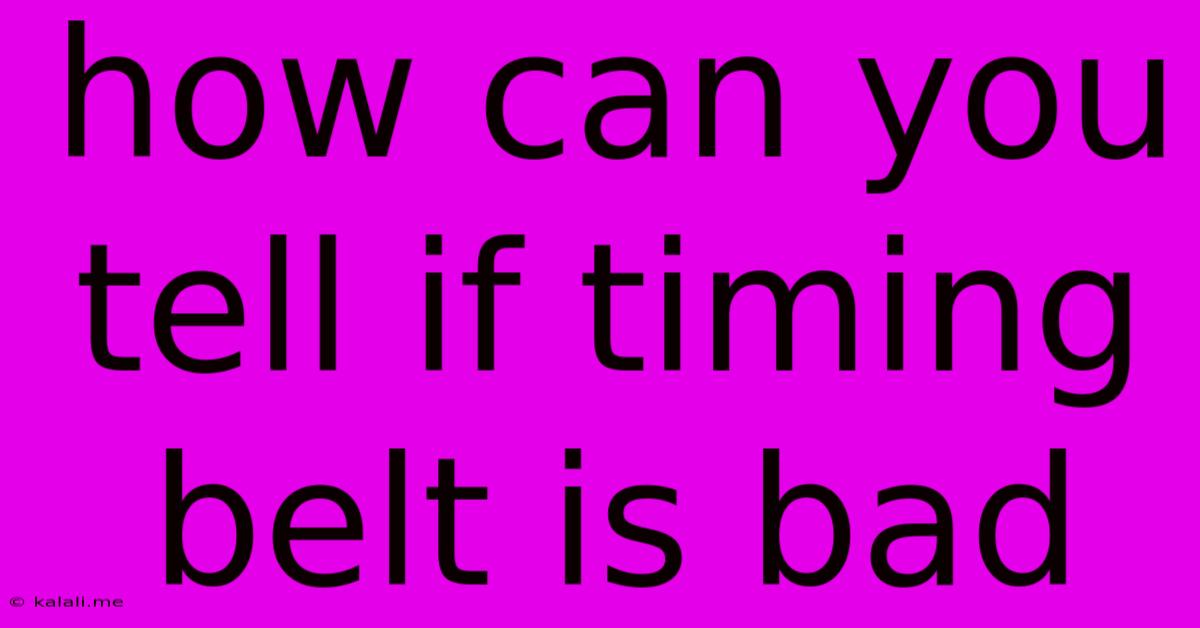How Can You Tell If Timing Belt Is Bad
Kalali
Jun 08, 2025 · 3 min read

Table of Contents
How Can You Tell If Your Timing Belt is Bad? A Comprehensive Guide
Is your car making strange noises? Experiencing unusual performance issues? A failing timing belt could be the culprit. Ignoring a worn timing belt can lead to catastrophic engine damage, resulting in costly repairs. This guide will help you identify the warning signs of a bad timing belt, so you can address the problem before it's too late. Regular maintenance and awareness of these symptoms can save you significant time and money.
Understanding the Importance of the Timing Belt
Before diving into the warning signs, let's briefly understand the timing belt's crucial role. This component synchronizes the crankshaft and camshaft, ensuring the engine's valves open and close at the precisely correct moments. A broken timing belt leads to a complete loss of synchronization, resulting in bent valves, piston damage, and potentially a total engine rebuild. That's why preventative maintenance is key.
Key Warning Signs of a Bad Timing Belt
Several indicators can point towards a failing or damaged timing belt. While some are subtle, others are unmistakable. Pay close attention to these signs:
1. Unusual Noises:
- Squealing or Whining: A high-pitched squeal, especially when starting the engine or accelerating, is a common sign of a worn timing belt. The belt may be slipping or starting to fray.
- Clicking or Rattling: These sounds might indicate the belt is loose, damaged, or has debris trapped within it. This warrants immediate attention.
- Grinding or Knocking: These more serious noises usually signify significant internal engine damage resulting from a broken or severely worn timing belt. This indicates an urgent need for professional assistance.
2. Visible Damage:
- Cracks or Frayed Edges: Regularly inspect the timing belt (if accessible) for visible cracks, fraying, or glazing. These imperfections indicate significant wear and tear.
- Missing Teeth or Deformations: Any missing teeth or significant deformation of the belt signifies a major problem and requires immediate replacement.
- Oil or Grease Stains: Oil or grease on the timing belt can degrade the material, shortening its lifespan and increasing the risk of failure.
3. Performance Issues:
- Rough Idling: A rough or erratic idle could indicate the timing belt is not functioning correctly, affecting engine synchronization.
- Difficulty Starting: A worn timing belt can make starting the engine more difficult, especially in colder weather.
- Loss of Power or Hesitation: A malfunctioning timing belt can impede engine performance, leading to a noticeable loss of power or hesitation during acceleration.
4. Check the Timing Belt's Age and Mileage:
Even without obvious signs of wear, a timing belt's lifespan is limited. Manufacturers typically recommend replacement at specific mileage intervals or after a certain number of years, regardless of condition. Consulting your vehicle's owner's manual is crucial for understanding the recommended replacement schedule. Proactive replacement is cheaper than catastrophic engine failure.
When to Seek Professional Help
If you notice any of the warning signs mentioned above, it's crucial to seek professional help immediately. Don't attempt to diagnose or repair a timing belt issue yourself unless you have extensive automotive experience. A broken timing belt can cause severe engine damage, resulting in expensive repairs or even the need for engine replacement.
Preventative Maintenance is Key
Regular vehicle maintenance is your best defense against timing belt failure. This includes adhering to the manufacturer's recommended replacement schedule and having a qualified mechanic inspect the belt during routine servicing. By staying proactive, you can avoid the significant costs and inconvenience associated with a catastrophic timing belt failure.
Latest Posts
Latest Posts
-
Can Forget Me Not Plant Be Planted Hydroponically Indoors
Jun 08, 2025
-
Blessed Are They That Die In The Lord
Jun 08, 2025
-
Can An Atheist Go To Heaven
Jun 08, 2025
-
Photoshop Transfer Only The Texture From One Layer To Another
Jun 08, 2025
-
How To Say Pie In Spanish
Jun 08, 2025
Related Post
Thank you for visiting our website which covers about How Can You Tell If Timing Belt Is Bad . We hope the information provided has been useful to you. Feel free to contact us if you have any questions or need further assistance. See you next time and don't miss to bookmark.